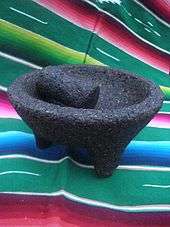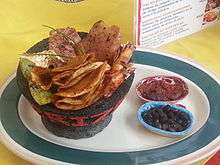Molcajete

A molcajete (mo̞lkaˈxe̞te̞ or mol-cah-hay’-tay; Mexican Spanish, from Nahuatl molcaxitl) is a stone tool, the traditional Mexican version of the mortar and pestle,[1] similar to the South American batan, used for grinding various food product.
Description
The molcajete was used by pre-Hispanic Mesoamerican cultures, including the Aztec and Maya, stretching back several thousand years. Traditionally carved out of a single block of vesicular basalt, molcajetes are typically round in shape and supported by three short legs. They are frequently decorated with the carved head of an animal on the outside edge of the bowl, giving the molcajete the appearance of a short, stout, three-legged animal. The pig is the most common animal head used for decoration of this type. The matching hand-held grinding tool, known as a tejolote (Mexican Spanish, from Nahuatl texolotl), is also made of the same basalt material.
Use and care
.jpg)

Molcajetes are used to crush and grind spices, and to prepare salsas and guacamole. The rough surface of the basalt stone creates a superb grinding surface that maintains itself over time as tiny bubbles in the basalt are ground down, replenishing the textured surface.
A new basalt molcajete needs to be "broken in" because small grains of basalt can be loosened from the surface when it is first used and this will give an unpleasant gritty texture to the first few items prepared in it. A simple way to do the initial "seasoning" is to grind uncooked white rice in the molcajete, a handful at a time. When the white rice flour has no visible grains of basalt in it, the molcajete is ready to use. Some rice flour may remain ground into the surface of the molcajete; this will cause no problem.
As the porous basalt is impossible to fully clean and sanitize, molcajetes are known to "season" (much like cast iron skillets), carrying over flavors from one preparation to another. Salsas and guacamole prepared in molcajetes are known to have a distinctive texture, and some also carry a subtle difference in flavor, from those prepared in blenders. Molcajetes can also be used as a cooking tool, where it is heated to a high temperature using an open fire or hot coals, and then used to heat its food contents. Although true molcajetes are made of basalt, imitations are sometimes made of a mixture of pressed concrete and volcanic rock particles.
Molcajetes are also used as dish service in restaurants and homes. While recipes are usually not stewed or otherwise cooked in them, the molcajete stays hot for a very long time due to its high thermal mass, and it is not unusual for a dish to still be bubbling a half-hour after serving.
See also
Footnotes
References
- Adams, Richard E.W. (2005). Prehistoric Mesoamerica (3rd ed.). Norman: University of Oklahoma Press. ISBN 0-8061-3702-9. OCLC 58975830.
- Coe, Sophie D. (1994). America's First Cuisines (4th pbk printing [2002], 1st ed.). Austin: University of Texas Press. ISBN 0-292-71159-X. OCLC 0292711557.
- Simmons, Marie (2008). Things Cooks Love: Implements, Ingredients, Recipes. Missouri: Andrews McMeel Publishing. ISBN 0740769766.
External links
| Look up Molcajete in Wiktionary, the free dictionary. |
- How to Season a Molcajete
- How to Season a Molcajete When You're Absolutely Tired of Grinding
- Molcajete
- Molcajete article on the ¡Mi Cultura is 2 Cultura! blog
- The Original Chile Grinder